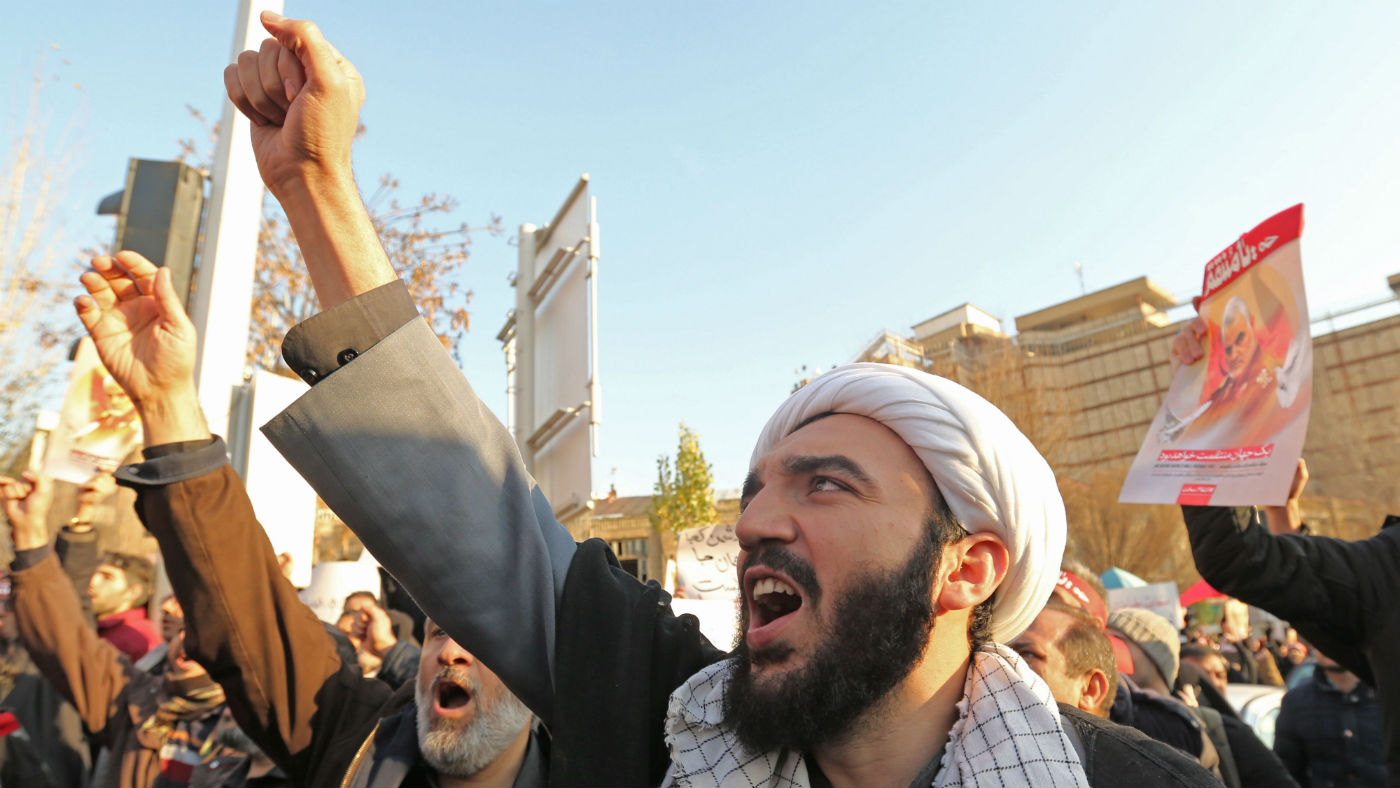British ambassador arrested in Iran as protests flare
High-ranking officials in Tehran call for Rob Macaire’s expulsion amid unrest following plane crash admission

A free daily email with the biggest news stories of the day – and the best features from TheWeek.com
You are now subscribed
Your newsletter sign-up was successful
Britain has condemned the arrest of its ambassador in Iran as a flagrant violation of international law, amid mounting protests against the Iranian regime following the downing of a passenger plane that killed all 176 people on board.
Rob Macaire was detained on Saturday after attending a vigil for those who died when Iran’s military shot down Ukraine International Airlines Flight 752 last week.
He tweeted to confirm he had left after five minutes when it turned into a protest, before being arrested and accused of helping to organise the demonstrations.
The Week
Escape your echo chamber. Get the facts behind the news, plus analysis from multiple perspectives.

Sign up for The Week's Free Newsletters
From our morning news briefing to a weekly Good News Newsletter, get the best of The Week delivered directly to your inbox.
From our morning news briefing to a weekly Good News Newsletter, get the best of The Week delivered directly to your inbox.
After initially dismissing reports that authorities had detained Britain’s top diplomat in the country, Iran’s deputy foreign minister, Seyed Abbas Araghchi, tweeted that after confirming Macaire’s identity on the telephone he was immediately released.
Appointed to the post in 2018, Macaire is “a highly experienced and level-headed diplomat and the likelihood of him actively joining protests, as opposed to observing events, is minimal,” The Guardian reports.
Nevertheless, The Times adds that “high-ranking figures within the Iranian regime are calling for Macaire’s expulsion amid rising turmoil in the country”.
Louise Callaghan in The Sunday Times writes that Iranians have reacted “with shock and incomprehension” after their military confessed to accidentally shooting down the Ukraine-bound airliner that crashed outside Tehran on Wednesday. Callaghan adds the confession “blows up” a “rare moment of national unity” following the US assassination of General Qasam Solemani.
A free daily email with the biggest news stories of the day – and the best features from TheWeek.com
–––––––––––––––––––––––––––––––For a round-up of the most important stories from around the world - and a concise, refreshing and balanced take on the week’s news agenda - try The Week magazine. Start your trial subscription today –––––––––––––––––––––––––––––––
Reuters reports that protesters took to the streets to “pile pressure on Iran’s leadership on Sunday with demands for top authorities to quit”.
The news agency says riot police fired teargas at thousands of protesters in the capital, “where many had chanted ‘Death to the dictator’, directing their anger at the Islamic Republic’s Supreme Leader Ayatollah Ali Khamenei”.
“The surging anger over the crash and the days of false denials comes at a sensitive moment in Iran and just weeks after the regime’s forces killed hundreds of civilians while crushing nationwide protests,” says The Daily Telegraph.
Khamenei quickly sought to distance himself from the crash and allegations he was responsible for misleading the public. Instead he “moved to place the blame on the military in an attempt to shield himself from responsibility”, the Telegraph adds.
“There were indications that the relatively moderate circle around Hassan Rouhani, Iran’s president, was also seizing the moment to push blame towards its hardline rivals inside the Revolutionary Guard”, reports the paper.
-
 How the FCC’s ‘equal time’ rule works
How the FCC’s ‘equal time’ rule worksIn the Spotlight The law is at the heart of the Colbert-CBS conflict
-
 What is the endgame in the DHS shutdown?
What is the endgame in the DHS shutdown?Today’s Big Question Democrats want to rein in ICE’s immigration crackdown
-
 ‘Poor time management isn’t just an inconvenience’
‘Poor time management isn’t just an inconvenience’Instant Opinion Opinion, comment and editorials of the day
-
 Will increasing tensions with Iran boil over into war?
Will increasing tensions with Iran boil over into war?Today’s Big Question President Donald Trump has recently been threatening the country
-
 Epstein files topple law CEO, roil UK government
Epstein files topple law CEO, roil UK governmentSpeed Read Peter Mandelson, Britain’s former ambassador to the US, is caught up in the scandal
-
 Iran and US prepare to meet after skirmishes
Iran and US prepare to meet after skirmishesSpeed Read The incident comes amid heightened tensions in the Middle East
-
 Which way will Trump go on Iran?
Which way will Trump go on Iran?Today’s Big Question Diplomatic talks set to be held in Turkey on Friday, but failure to reach an agreement could have ‘terrible’ global ramifications
-
 Israel retrieves final hostage’s body from Gaza
Israel retrieves final hostage’s body from GazaSpeed Read The 24-year-old police officer was killed during the initial Hamas attack
-
 China’s Xi targets top general in growing purge
China’s Xi targets top general in growing purgeSpeed Read Zhang Youxia is being investigated over ‘grave violations’ of the law
-
 Panama and Canada are negotiating over a crucial copper mine
Panama and Canada are negotiating over a crucial copper mineIn the Spotlight Panama is set to make a final decision on the mine this summer
-
 Iran unleashes carnage on its own people
Iran unleashes carnage on its own peopleFeature Demonstrations began in late December as an economic protest